An Introduction To Canon Tilt-Shift Lenses By Vincent Laforet

The Canon Digital Learning Center posted the first video of a 3 parts series about the basics of tilt-shift lenses. The host is no less than Canon Explorer of Light Vincent Laforet.
Join Explorer of Light Vincent Laforet on location in New York City as he shares practical examples of how to use Canon’s tilt-shift lenses for architecture, portrait, lifestyle, and tabletop photography. Learn how a tilt-shift lens can correct, enhance and dramatically change a composition.
In Episode 1, Vincent gives an overview of what a tilt-shift lens is and how it differs from other lenses in the EOS lineup.
In Episode 2, Vincent talks about the shift property of the lens and how it can be used to correct distortion and also aid in multi-shot stitching by showing a few practical examples from around the city.
In Episode 3, Vincent shows a few examples of how the tilt functionality of the lens can shift the plane of focus to create a miniature look as well as increase the focus plane.




